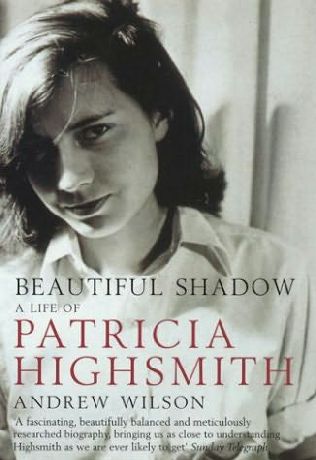 One paper yet to write, but the exams are done. Meanwhile, I have gotten through close to half of Beautiful Shadow a biography of Patricia Highsmith. What a life of tumultous romance, and endless moving from place to place - Texas to New York to Paris to Mexico to Venice to Positano (where part of The Talented Mr. Ripley is set).
One paper yet to write, but the exams are done. Meanwhile, I have gotten through close to half of Beautiful Shadow a biography of Patricia Highsmith. What a life of tumultous romance, and endless moving from place to place - Texas to New York to Paris to Mexico to Venice to Positano (where part of The Talented Mr. Ripley is set).'The individual has manifold shadows, all of which resemble him, and from time to time have equal claim to be the man himself'That is the apt quote of Kierkegaard from Highsmith's journal with which Andrew Wilson begins his first chapter. Highsmith was certainly well acquainted with her dark side and seemed driven to write from and of it. It makes me wonder what she would have written had she not had such a hard time creating satisfying, stable relationships. In some ways she was just a natural outsider to experience in general, a reflective, serious person. But another influential ingredient was the fact that she was gay and lived in both a time and a country that was unaccepting of her feelings. Who's to say which came first, being gay or being an outsider but I have my suspicions. Regardless, this is the point of view from which she experienced life and the source that flowed from her. In some ways, she was so interested in the conflict and in the darkness, one could posit that she was drawn to loving people she couldn't have or that perhaps not having them was a kind of satisfaction for her:
From the beginning of their friendship, Highsmith knew that Rosalind was attached - her partner was the artist and gallery owner Betty Parsons - and it seems her very unobtainability was one of her most attractive qualities. 'When we love unrequited we are very much conscious that we are in love. That is all we have to think about,' she wrote. 'When our love is returned there is, in me, at least, a holding back, almost a fear of perfection.'Certainly longing makes for great art so we as readers should not complain.
Highsmith considered that as writer she was an entertainer, yet her natural seriousness drove her to write each book as:
...an argument with myself, and I would write it whether it is ever published or not.Not finding predictability in life, she cultivated a preferenced for exploring the chaos:
'Admit that human life can be guided by reason and all possibility of life is annihilated,' she wrote, quoting Tolstoy, in one of her journals. She celebrated irrationality, chaos and emotional anarchy, and regarded the criminal as the perfect example of the twentieth-century existentialist hero, a man she believed was 'active, free in spirit'.Or, a quote from Karl Menninger's book The Human Mind which Highsmith read and was influenced by in her youth.
'The adjuration to be "normal" seems shockingly repellent to me; I see neither hope nor comfort in sinking to that low level. I think it is ignorance that makes people think of abnormality only with horror and allows them to remain undismayed at the proximity of "normal" to average and mediocre. For surely anyone who achieves anything is, a priori, abnormal...'
Great quote. Without divergence from normal we would have no inventions, no great leaders, nothing new in music, in architecture... From a genetic point of view, without mutation we have no variability in the genome and would cease to evolve and eventually die because of the microbes that would continue to evolve while we didn't. This is one of my favorite topics, positive deviance as Atul Gawande calls it. And with no variability in our environment, face it, we'd be bored to death. Well I would anyway.
I love the fact the Highsmith read pulp novels in order to analyze their writing techniques. I'll leave you with Andrew Wilson's description of the writing points she gleaned from them:
She admired them for their clear cut narratives and simple style, but at the same time she also revelled in a sense of superiority, a knowledge that she, in fact, could do better. At working she should remember to set the scene quickly and get straight to the point; she should write quickly and with ease, as too much effort would result in a tired style; describe only the feelings and viewpoint of the main characters; make sure the end result was entertaining, as this was prime reason people picked up a novel; and always try to leave the reader begging for more.
















No comments:
Post a Comment